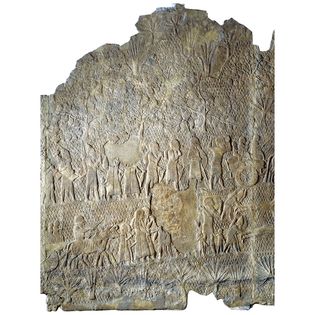- 1:1
Elkosh is a town near Ninevah. It is also a town in southern Judah.
And "Caperneum" in Galilee literally means "Town of Nahum". I'm going
with Judah, as it is a message for Judah.
- 1:2
Nahum means "comfort". How many in America today are uncomfortable with the
wrath of God. When you are suffering under the hand of the
wicked, the wrath of God is a comfort. Part of our discomfort is knowing
that we too deserve judgement. Thanks be to God - Jesus has paid all
our sins.
- 1:3
"Slow to anger" - echoing
Jonah 4:2. Jonah forgot
that God also would not leave the guilty unpunished. It has
been 100 years since Jonah brought God's grace to Nineveh. Nineveh is
now the capital of the empire, and except for a remnant, repentance is
forgotten.
- 1:8
"With an overwhelming flood" - Nabopolassar led a coalition of armies
from all over the empire. All were chafing under the cruel oppression
of Assyria. Also, a literal flood was a crucial element of the fall of
Nineveh described in chapter 2.
"pursue into darkness" - the most common description of Hell in the
Bible is of darkness rather than fire. God is not willing that any
should perish, and pursues and calls after his enemies as they flee into the
outer darkness from His presence.
- 1:9
"affliction will not rise up a second time" - God will not prolong the agony.
"When I begin, I will also make an end."
1 Samuel 3:12

- 1:11
"From you came one who plotted evil against the LORD" - Sennacherib
attacked Hezekiah, and defied the LORD Himself, a type of the antichrist,
2 Kings 19:21-23.
Sennacherib moved the capital of the empire to Nineveh and enlarged
the fortifications in 705 BC. The relief at right shows torture
and relocation of the Jews at Lachish during that attack.
God said: "Assyria oppressed them without cause."
Isaiah 52:4-6
See also Psalm 2.
- 1:12
"Allied and numerous" - the King James and other old translations say
"quiet and many", the literal meaning of the Hebrew. After the Library
of Nineveh was excavated, we learned that this is a Hebrew transliteration
of a common legal phrase in the Assyrian empire similar to "joint and several"
in English law.
"Though I afflicted you, I will afflict you no more." God will
remove the yoke of Assyria from Judah. The decline of Assyria begins
a few years after Manasseh is returned from Babylon with the rise of
the Medes in power, and Judah is relatively unmolested through the reign of
Josiah.
- 1:14
"No more shall your name be perpetuated" - so thoroughly was this fulfilled,
that skeptics ridiculed the idea that Nineveh was a real city until
it was excavated in the early 19th century.
"Out of the house of your gods I will cut off the carved image" - the
gods of Assyria will be abandoned and the city buried.
- 1:15
"How lovely on the mountains are the feet of him who brings
good news" - Isaiah 52:7
When the wicked perish, there are shouts of joy,
Proverbs 11:10.
But compare
Proverbs 24:17-19.
See also Psalm 37.
